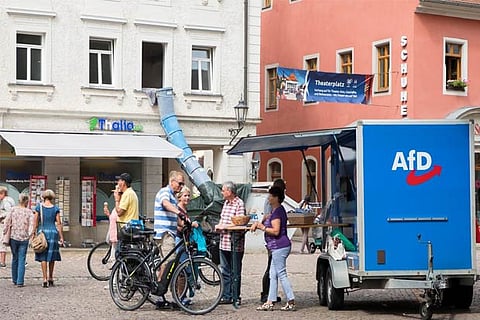

Berlin
A surge in support for the far-right Alternative for Germany (AfD) party before regional elections next month in two former communist eastern states threatens to wreck Chancellor Angela Merkel’s unwieldy right-left coalition government.
Merkel’s conservatives and the centre-left Social Democrats (SPD) jointly run the state of Saxony, mirroring their coalition at the national level in Berlin. In neighbouring Brandenburg, the SPD governs along with the radical Left Party.
Opinion polls suggest the anti-immigrant AfD could come first in both states in the Sept. 1 elections, in what would be a humiliating outcome for Merkel’s party and the SPD, which have ruled Germany together for 10 of her past 14 years in power.
Losing Brandenburg, a state the SPD has run since German reunification in 1990, would intensify calls within the party for it to quit Merkel’s coalition and to rebuild in opposition following a nationwide slump in its support to below 15%.
Similarly, defeat for Merkel’s Christian Democratic Union (CDU) in Saxony, which it has run for three decades, would pile pressure on her preferred successor as chancellor, party chair and German defence minister Annegret Kramp-Karrenbauer.
The AfD has found fertile ground for its anti-migrant message in the two relatively poor eastern states, which share a large mining region that is threatened by government plans to phase out coal.
“The AfD propaganda seems to be working and there is nothing the CDU can do about it,” said CDU voter Christian Hoffmann, pointing to an AfD poster in the historic Saxony town of Meissen that read: “Money for pensioners, not for illegal migrants”.
“If the AfD win, the (national) coalition is probably going to fall apart,” added Hoffman, 70, a retired mechanical engineer. “They have been struggling to keep it together and the fallout from the elections could be the end of the government.” MIGRANTS
Merkel’s coalition, which the SPD joined only reluctantly after the 2017 national election, has been weakened by disputes over asylum policy, the fate of an ex-intelligence chief accused of far-right sympathies, and painful losses in regional votes.
Ominously for Merkel, her CDU lost votes to the AfD in the European elections in May in Saxony as also nationwide.
The AfD stormed into the national parliament, the Bundestag, in 2017 on a wave of popular anger over Merkel’s decision to take about one million mainly Muslim refugees fleeing wars and poverty in the Middle East and beyond.
The AfD says the migrants pose a threat to German culture. It wants to turn away those who enter Germany without identification documents, restrict migrant access to welfare, ban the construction of mosques with minarets and speed up the deportation of rejected asylum seekers.
The AfD also says migrants are behind a spike in violent crime, a view contested by other parties.
The town of Chemnitz in Saxony, birthplace of the anti-Islam PEGIDA movement, hit the headlines a year ago when it was shaken by the most violent far-right protests in decades.
In Meissen, a town of 28,000 and famed for its porcelain industry, only 5.6% of the population are foreigners compared with a national figure of about 13%. But a debate last week between the main election candidates was dominated by questions about the costs of integrating the migrants.
“The AfD is not racist. It is the only party that tells the truth,” said Dirk Fuckner, a 50-year-old sales manager who was handing out AfD flyers reading ‘Resolute Deportation’.
“The people coming here are not refugees. Most are economic migrants and they should go back,” said Fuckner, a former CDU voter who says he switched to the AfD in protest at Merkel’s 2015 decision to open Germany’s doors to migrants.
But even if the AfD tops the polls in Saxony and Brandenburg, it is unlikely to enter the government of either state because mainstream parties refuse to do deals with it.
The CDU and SPD could end up forging a coalition in Saxony with the Greens, which like the AfD is experiencing a surge in support nationwide. Though traditionally stronger in affluent western Germany, they are seen more than doubling their vote in Saxony and Brandenburg.
SPD TRAIN CRASH
With the AfD almost certain to come first in Brandenburg with just over a fifth of votes, the only workable coalition would be led by the CDU, the second-largest party, and also include the SPD and Greens.
This would be yet another painful blow for the SPD, which has been embroiled in a protracted leadership contest since June when Andrea Nahles quit after her party’s poor showing in the EU elections.
The SPD will elect a new leader at a summit in December, when it is also expected to review its coalition with the conservatives, whose mandate runs until 2021.
“There is a good reason why we are electing a new leader in December,” said Frank Richter, the SPD candidate in Meissen.
“Nobody wants to be in the driving seat when the train crashes,” he said, referring to the elections in Saxony and Brandenburg and in the eastern region of Thuringia in October.
“The pressure on the coalition is going to be massive. The SPD may have no choice but to walk away.”
Visit news.dtnext.in to explore our interactive epaper!
Download the DT Next app for more exciting features!
Click here for iOS
Click here for Android